Alabama GOP leadership passes resolution in support of Chief Justice Roy Moore
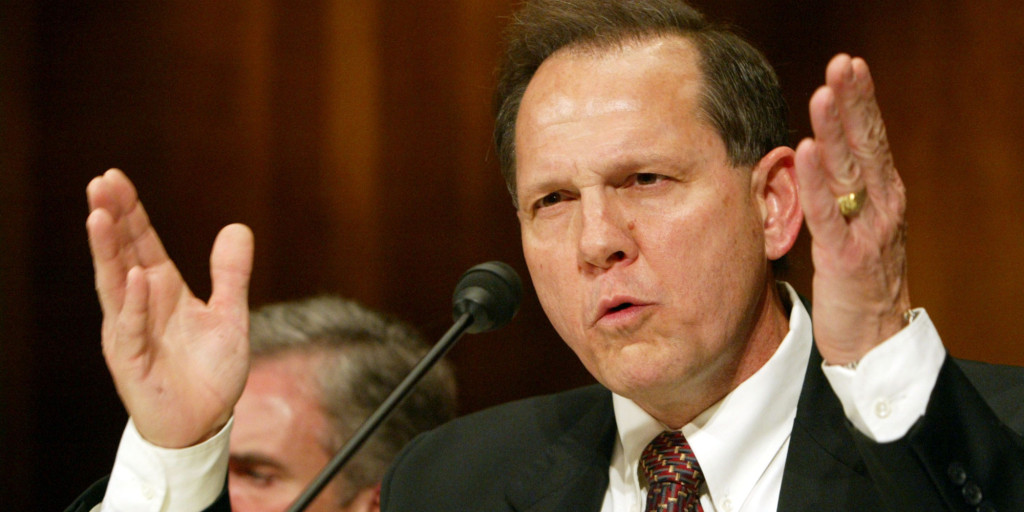
The Alabama GOP State Executive Committee passed a resolution over the weekend in support of currently suspended Alabama Supreme Court Chief Justice Roy Moore at a special meeting called to elect alternate delegates to the Republican National Convention. Moore was suspended from his position following complaints made to the Judicial Inquiry Commission by the ACLU and other civil rights activism groups. The appointed body, which oversees the state’s judges, said the 69-year-old jurist “abused his office by issuing an administrative order to probate judges in January telling them an Alabama court order and law banning same-sex marriages remained in effect despite the U.S. Supreme Court decision affirming same-sex marriage six months earlier,” according to a report by The Associated Press. The suspension is Moore’s second, his first ending in an eventual removal from office in 2003 for violating a federal judge’s order to remove a large Ten Commandments monument from public property. Moore was subsequently re-elected to his position in 2010 in a landslide win. “Chief Justice Roy Moore has been a consistent proponent of our pro-life and traditional marriage values, which are the positions of the Alabama Republican Party,” the resolution reads, in part, “and… we believe that any statewide elected official should only be impeached and subsequently removed from office by the elected legislature.” ALGOP isn’t the first group to speak in support of the Chief Justice. Over the weekend, a group of conservatives rallied in Montgomery in an outcry over Moore’s removal. “We can’t believe what’s unfolding before our eyes here in Alabama and across the nation,” wrote the group’s spokesperson Hannah Ford in a release. “If you’ve ever wanted to be a voice for truth, for God, for marriage, for morality, for the Gospel, for your children and grandchildren, for the Constitution of the United States, and the laws of Alabama, this is your time. Chief Justice Moore has been a lone voice for God’s law and for a proper interpretation of the Constitution in the midst of those who hate both and now they’re trying to take him down.” Find below the entire text of the resolution passed by ALGOP. WHEREAS, Chief Justice Roy Moore was elected by the voters of the State of Alabama, WHEREAS, Chief Justice Roy Moore has been a consistent proponent of our pro-life and traditional marriage values, which are the positions of the Alabama Republican Party, and WHEREAS, we believe that any statewide elected official should only be impeached and subsequently removed from office by the elected legislature, THEREFORE, BE IT RESOLVED BY the Alabama Republican Party that we call on the Court of the Judiciary to drop the politically motivated charges against Chief Justice Roy Moore, and THEREFORE, BE IT FURTHER RESOLVED BY the Alabama Republican Party that we call on the legislature to pass legal changes that would prevent the political removal of statewide elected officials, unless done so by the elected legislature of the state. Adopted, this the 21st day of May, in the Year of Our Lord 2016, by the State Executive Committee of the Alabama Republican Party.
Darryl Paulson: It’s now or never for #NeverTrump
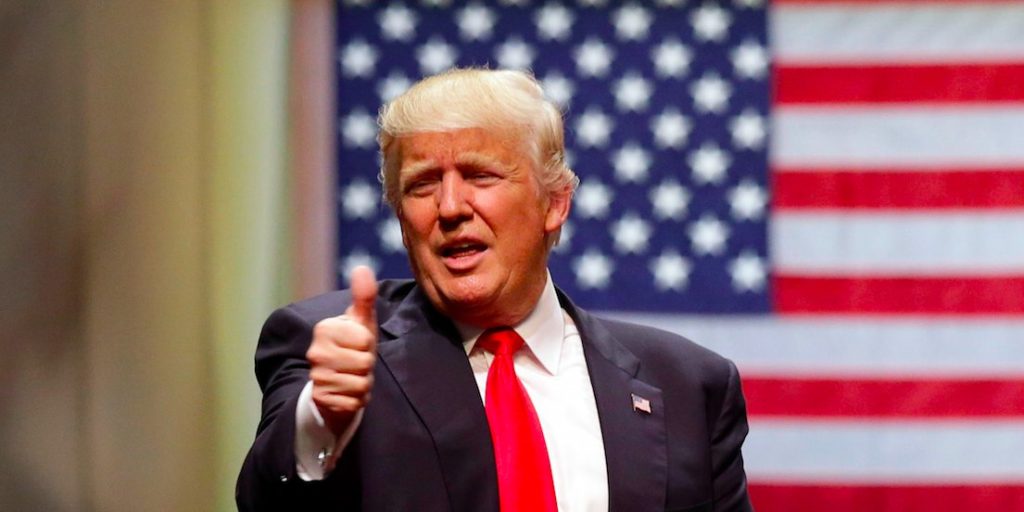
The opposition to Donald Trump has been constant from the start of the 2016 presidential campaign. However, it has been unfocused and essentially leaderless. Many Trump opponents believed he would not enter the race. When he entered, they believed he had no chance of winning. Now that Trump has won the nomination, they believe he can be stopped by an independent or third party campaign. As early as December 2015, before the first caucus or primary, Mike Fernandez, a Coral Gables, Florida health care executive and financial backer of Jeb Bush, took out full-page ads in the Miami Herald and other newspapers stating that he would support Hillary Clinton over Donald Trump. Fernandez described Trump as a narcissistic ”Bullyionaire” with a hunger to be adored. Fernandez was critical of fellow Republicans “blinded by the demagoguery” of Trump. In January 2016, National Review devoted an issue to conservative writers who made the case that Trump was not a conservative, and his nomination would do long-term damage to conservatism and the Republican Party. The issue contributed to the formation of the #NeverTrump movement, but it failed to stop Trump from winning the GOP nomination. With Trump having secured the nomination, many Republicans now look at the race as a binary choice: Donald Trump or Hillary Clinton. Most Republicans, unlike Mike Fernandez, see Trump as the preferred option. Foster Friess, a Wyoming financier and supporter of Republican candidates and causes, said Trump was not his first choice, but “he’s better than Hillary.” During the presidential primaries, even Jeb Bush stated that “Anybody is better than Hilary.” Some of Trump’s strongest critics have now jumped aboard the bandwagon. Texas Governor Rick Perry, who called Trump a “cancer” on the GOP who would lead the party to “Perdition,” has now offered to help Trump win the election. Oh, by the way, he would also be interested in being Trump’s Vice President. Many Republicans believe it is now a question of party loyalty. As Republican strategist Ford O’Connell observes, “political parties are not meant to be ideological vessels, but competing enterprises whose job is to win elections.” Rick Wilson, one of the most vehement anti-Trumpers, described the party loyalty argument as nothing more than “the DC establishment rolling over and becoming the Vichy Republicans we all know they would.” The last hope of the #NeverTrump movement is recruiting an independent or third-party candidate to provide an alternative to Trump and Clinton. RNC Chair Reince Priebus calls such efforts a “suicide mission.” Supporters argue that an independent candidate would not only give discontented voters a choice, but they believe such a candidate could win. At the very least, such a candidate could siphon off enough electoral votes to throw the election into the House, where the Republican majority could select someone other than Trump or Clinton. Supporters of an independent option argue that recent polls show 58 percent of voters are not happy with their choices, and 55 percent say they support an independent candidate. Historically, the idea of an independent candidate is more appealing than the reality. Teddy Roosevelt and his Bull Moose Party is widely regarded the most effective third-party movement. Roosevelt actually came in second and swamped incumbent Republican President William Howard Taft. Roosevelt received 27.4 percent of the vote and 88 electoral votes to only 23.2 percent and 8 electoral votes for Taft. In 1948, Governor Strom Thurmond of South Carolina won only 2.4 percent of the national vote but, because it was concentrated in a few Deep South states where Truman’s name did not appear on the ballot, Thurmond captured the electoral votes of four states. Twenty years later, Governor George Wallace replicated much of Thurmond’s success in winning 13.5 percent of the vote and 46 electoral votes in five southern states. In 1992, Texas businessman Ross Perot and his Reform Party won almost one out of five votes, but failed to capture a single state. At one point, Perot led both George H. W. Bush and Bill Clinton but, as Election Day approached, many of his supporters returned to support their traditional party. To run as an independent or third-party candidate, there is one important requirement: you need a candidate. So far, the #NeverTrump movement has not found a willing person to oppose Trump. Among the possible candidates are Mitt Romney, the 2012 Republican presidential nominee. Romney has name recognition and money, and would likely qualify for the debates. Romney was opposed by many conservatives in his 2012 race which would once again be a problem. In addition, Romney’s enthusiastic acceptance of Trump’s endorsement in that campaign would be another concern. Marine Corps General James Mattis seriously considered running before backing out. Mattis would have commanded support as a military figure and a political outsider. But, Mattis is not an Eisenhower and is an unknown commodity. Marco Rubio‘s name is being tossed about as a possible candidate. Rubio is young, charismatic and has appealed to woman and minority voters. The downside is that Rubio won only in Puerto Rico, Minnesota and the District of Columbia, and badly lost his home state of Florida to Trump. In addition, Rubio signed the pledge to support the Republican nominee “and I intend to keep it.” Ben Sasse, a first-term Republican Senator from Nebraska, has been a leader in the #NeverTrump movement. Sasse is only in his second year as a senator, which will raise questions about his experience. He also is unknown outside of Nebraska. Finally, former House member and Senator Tom Colburn has expressed interest in running and is highly respected by conservatives for his attempts to cut federal spending. Colburn has stated that Trump “needs to be stopped,” but recently said he would not be the candidate. One of the maxims of politics is that it takes something to beat nothing. So far, nothing looks like he has the race all wrapped up. ___ Darryl Paulson is Professor Emeritus of Government at USF St. Petersburg.
In swing state suburbs, white women are skeptical of Donald Trump

For Donald Trump to win the White House in November, he’ll need the votes of women like Elizabeth Andrus. Yet Andrus, a registered Republican from Delaware, Ohio, sees “buffoonery” in the presumptive Republican nominee and says “I am not on the Trump train.” With all the trouble in the world, she went on, “you just don’t want Donald Trump as president.” Her negative impression of Trump was shared by most of the dozens of white, suburban women from politically important states who were interviewed by The Associated Press this spring. Their views are reflected in opinion polls, such as a recent AP-GfK survey that found 70 percent of women have unfavorable opinions of Trump. Democrat Hillary Clinton‘s campaign sees that staggering figure as a tantalizing general election opening. While white voters continue to abandon the Democratic Party, small gains with white women could help put likely nominee Clinton over the top if the November election is close. Democrats believe these women could open up opportunities for Clinton in North Carolina, where President Barack Obama struggled with white voters in his narrow loss in the state 2012, and even in Georgia, a Republican stronghold that Democrats hope to make competitive. Patty Funderburg of Charlotte, North Carolina, voted for Republican Mitt Romney in 2012, but says she’s already convinced that Trump won’t get her vote. “He’s not who I’d want to represent our country,” said Funderburg, a 54-year-old mother of three. Trump insists he’s “going to do great with women.” He’s also said he will link Clinton aggressively to past indiscretions with women by her husband, former President Bill Clinton. He made good on that pledge Monday, releasing an online video featuring a photo of the former president with a cigar in his mouth and statements that appear to come from women who have accused Clinton of sexual assault. Trump sent the video from his Twitter account with the message, “Is Hillary really protecting women?” The businessman also has previewed an argument focused on national security, with echoes of the pitch that President George W. Bush successfully made to white suburban women during his 2004 re-election. “Women want, above all else, they want security,” Trump told The Associated Press recently. “They want to have a strong military, they want to have strong borders. They don’t want crime.” He said “Hillary is viewed poorly on that.” Not so in the AP-GfK poll. About 40 percent of women surveyed said Clinton would be best at protecting the country and handling the threat posed by the Islamic State group, and about 30 percent said Trump. Throughout the primary, Clinton has talked about policies meant to appeal to women: equal pay, expanded child care, paid family and medical leave and more. And Trump has his own complicated past regarding women and has faced criticism for his actions both in his personal life and at his businesses toward them. He’s vigorously defended his treatment of women, as has his daughter Ivanka Trump, who said her father “has total respect for women.” A super political action committee backing Clinton has released its first television advertisements featuring Trump’s contentious statements about women. “Does Donald Trump really speak for you?” the super PAC ad asks. For many of the women interviewed, the answer appears to be no. Andrus, a Republican who nevertheless voted twice for Obama, praised Trump’s political skills and argued his business career indicates an intellect and ability that could benefit the nation. But his temperament, she said, is somewhere between “buffoonery” and “complete narcissism.” “It would be like having Putin for president,” she added, referring to Russia’s sometimes belligerent president, Vladimir Putin. Erin Freedman, a 38-year-old from Reston, Virginia, said Trump scares her. While she’s an enthusiastic backer of Clinton’s primary rival, Bernie Sanders, she said she’d have no problem backing the former secretary of state against Trump in a general election. Even some reluctant Trump supporters say they want him to dial back the braggadocio and caustic insults, and engage people more seriously. “He’s the nominee, so I’ll vote for him,” said Renee Herman, a 45-year-old from Sunbury, Ohio, who preferred retired neurosurgeon Ben Carson and her home-state governor, John Kasich, in the GOP primary field. “But it’s time we get past all this showmanship and hear from him what he actually wants to do and his plans for how to do it.” Trump’s best opening is that Clinton, who is on the cusp of clinching her party’s nomination, would enter the November race with a majority of Americans taking a dim view of her candidacy. Fifty-five percent have a negative view of Clinton, including 53 percent of women, in the AP-GfK poll. “Anybody but Hillary,” said Carolyn Owen, a 64-year-old educator from Clayton, North Carolina, near Raleigh. She said Trump wasn’t her first choice, “but it’s better than the alternative.” While Obama won the support of women overall in his two White House campaigns, white women have increasingly been shifting toward the Republican Party in recent elections. Obama only won 42 percent of white women in 2012. Romney won 56 percent of white women, more than Bush and the party’s 2008 nominee, Sen. John McCain. Clinton’s hopes will largely hinge on replicating Obama’s coalition of blacks, Hispanics and young people. In both of his elections, Obama earned near-unanimous support from black women, while drawing the votes of roughly 7 in 10 Hispanic women. But she would have more room for error with those groups if she can increase Democrats’ share of white women. Another potentially favorable scenario for Clinton involves Republican and independent women who can’t stomach a vote for Trump but also don’t want to vote for a Democrat. Maybe they simply stay home, keeping the GOP nominee’s vote totals down. For Angee Stephens of Indianola, Iowa, that seems to be the only option at this point. She’s wary of Clinton’s use of a private email server while she was secretary of state, which is the subject of an FBI investigation, and her
VA Secretary Robert McDonald: Disney doesn’t measure wait times, neither should VA

Veterans Affairs Secretary Robert McDonald compared the length of time veterans’ wait to receive health care from the VA to the length of time people wait for rides at Disneyland, and said that Disney doesn’t keep track of wait times, so Veterans Affairs shouldn’t either as it’s not a valid measure of one’s overall experience. “When you got to Disney, do they measure the number of hours you wait in line? Or what’s important?” McDonald asked reporters Monday during a Christian Science Monitor breakfast. “What’s important is, what’s your satisfaction with the experience? And what I would like to move to, eventually, is that kind of measure.” The comparison brought swift disapproval from Republicans and veterans organizations alike who were none too pleased with Secretary McDonald’s analogy in light of the scandal that exploded two years ago when it was revealed that the VA was attempting to cover up long wait times. Republican Presidential front-runner Donald Trump took a moment to try to gain political traction, saying he would “take care” of America’s vets. Obama’s VA Secretary just said we shouldn’t measure wait times. Hillary says VA problems are not ‘widespread.’ I will take care of our vets! — Donald J. Trump (@realDonaldTrump) May 23, 2016 Wisconsin Republican and U.S. Speaker of the House Paul Ryan ripped into McDonald with a series of tweets saying unlike Disneyland, the VA “is not make-believe.” This is not make-believe, Mr. Secretary. Veterans have died waiting in those lines. https://t.co/OxfT3AYzTi — Paul Ryan (@SpeakerRyan) May 23, 2016 The happiest place on earth? Secretary McDonald compares #VA lines to #Disneyland. Seriously. https://t.co/SmvIKqxGKW — Paul Ryan (@SpeakerRyan) May 23, 2016 There’s no Fast Pass at the #VA. #Veterans seeking medical attention don’t have that luxury. https://t.co/SmvIKqxGKW — Paul Ryan (@SpeakerRyan) May 23, 2016 Concerned Veterans for America called the remarks offensive. “It also shows that he doesn’t even view long wait times and secret wait lists as real problems in need of a fix,” said John Cooper, a spokesman for Concerned Veterans for America. “To compare veterans’ experiences waiting weeks and months for care to tourists waiting in line to see Mickey Mouse demonstrates just how out of touch the secretary is with the struggles many veterans deal with while waiting for care at the VA.” McDonald’s controversial comment was in response to a question as to why the VA won’t publish the average time a veteran has to wait from the day he or she calls and asks for an appointment, known as the “create date.” Instead, the VA publishes its average wait times based on the “preferred date,” or the day a VA scheduler actually puts an appointment time on the books. McDonald went on to explain that the “create date” was not a “valid” measure of the VA’s success.
Robert Bentley’s campaign seeks to dismiss Spencer Collier lawsuit
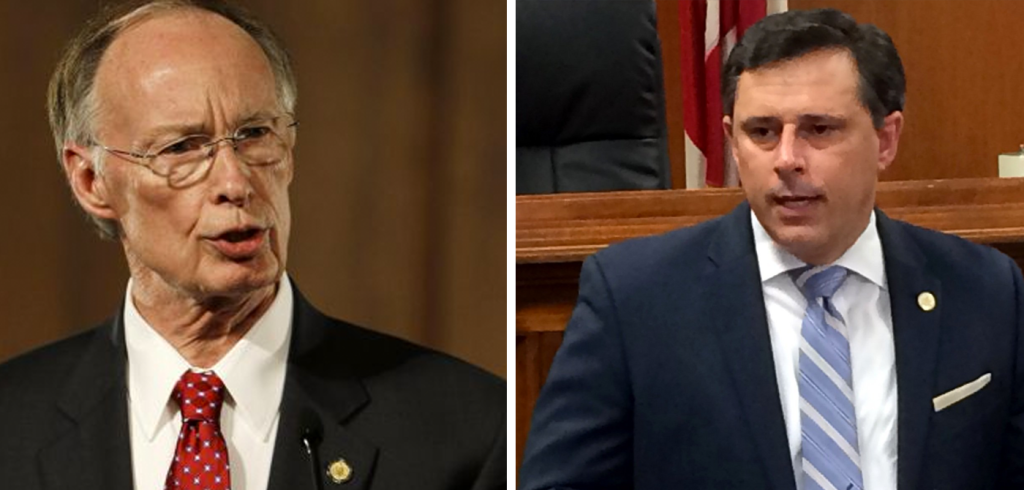
Alabama Governor Robert Bentley‘s campaign attorneys are seeking to dismiss a lawsuit filed by former Alabama Law Enforcement Agency chief Spencer Collier in the aftermath of the latter’s termination. The governor’s lawyers argued in a motion filed Monday morning that the lawsuit’s allegations are too “vague” and “ambiguous.” Spencer Collier, who accused Bentley of having an affair with former senior advisor Rebekah Mason the day after he was fired, said in the lawsuit that Bentley and Mason made misleading statements to the media in an effort to discredit him. “Their lies have hurt me financially, have severely damaged my reputation and they have made it their mission to permanently end my career in law enforcement,” Collier said in a statement regarding the lawsuit. The lawsuit named four other defendants besides the Bentley campaign (Bentley for Governor, Inc.) Gov. Bentley himself, new ALEA Secretary Stan Stabler, Rebekah Mason, and the group through which she was paid, the Alabama Council for Excellent Government. The two-page filing is the only response to the lawsuit thus far submitted by any of its defendants. “The only basis of the complaint against this defendant appears to be the allegations that defendant Mason is an agent or servant of this defendant,” Bentley for Governor, Inc.’s lawyers wrote in the two-page document. “Said allegations in this regard are insufficient and not in accordance with the Alabama Rules of Civil Procedure. “The complaint is so general, vague and/or ambiguous that Defendant cannot reasonably frame or file a responsive motion and/or pleading. Plaintiff has failed to provide sufficient factual descriptions of the alleged actions by this Defendant.” The lawsuit and Monday’s motion were filed in Montgomery Circuit Court. The governor has maintained his own innocence throughout the months following Collier’s allegations. Efforts to impeach Bentley have thus far fallen short, facing opposition in the Alabama Legislature.
New study ranks Attalla most affordable place to live in Alabama

Nestled along I-59, not quite an hour outside of Birmingham, Attalla, Ala., has been ranked the most affordable place in the state to own a home for the second year in a row, according to a recent analysis from the national financial technology firm, SmartAsset. But there’s a lot more to home affordability than the listing price. Which is why SmartAsset took a holistic approach: considering closing costs, real estate taxes, homeowners insurance and mortgage rates in their analysis. Specifically, they looked at the total cost over five years of these four expenses — closing costs, taxes, insurance and mortgage payments — for the average home in every county and every city with a population greater than 5,000. They then took that five-year cost as a proportion of median household income in each county and city to determine affordability. The most affordable cities and counties were those in which total housing costs on an average house accounted for the smallest proportion of the median income. Here’s SmartAsset’s list of the top 10 most affordable places to live in Alabama:
This week in the U.S. House of Representatives, Senate: May 23 – 27, 2016
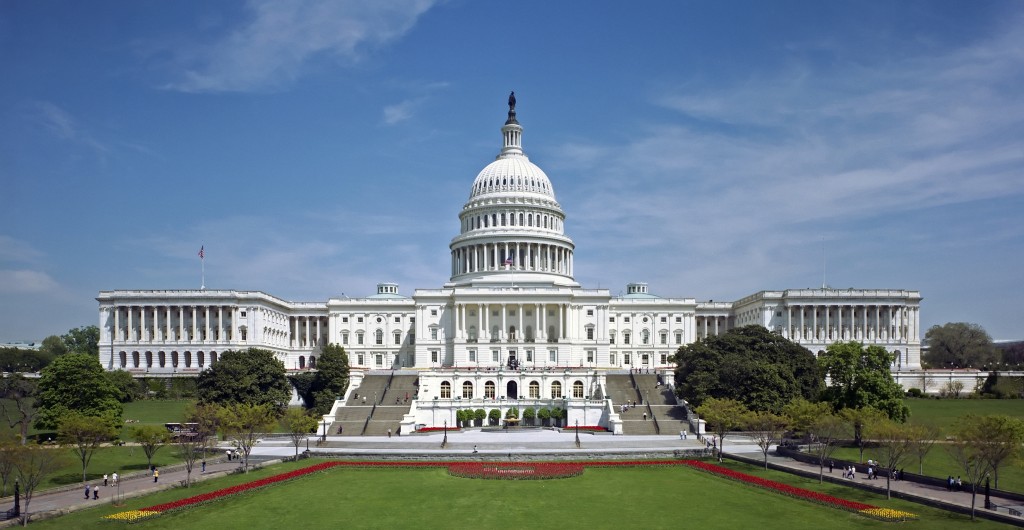
Both chambers are in session this week. U.S. House of Representatives On Monday, the House is in session and will consider several bills under Suspension of the Rules. A full list of bills can be found here. Among these bills is: H.R. 4889: the Kelsey Smith Act. This bill requires mobile phone service providers to provide call location information to law enforcement when the device has been used to call “911” for emergency assistance Alabama co-sponsor(s): None. Background: named after Kelsey Smith, who in 2007 was abducted from a parking lot in Kansas. While a search for her began immediately, law enforcement encountered difficulty in obtaining location information from her cell phone provider. After four days of searching, police located her body within 45 minutes of finally receiving the data. Kelsey had been murdered the night she was abducted. H.R. 4167: the Kari’s Law Act. This bill requires all multiline telephone systems to be able to dial “911” without the need to dial an additional number. Alabama co-sponsor(s): Rep. Bradley Byrne (AL-01); Mo Brooks (AL-05) Background: named after Kari Rene Hunt, who in 2013 was murdered by her estranged husband. She agreed to meet her husband at a local motel to leave their children with him for a short visit. At the meeting, her husband attacked her. Kari’s daughter, then 9 years old, attempted to dial 911 from the room phone. However, the phones required the user to dial “9” before dialing “911” and she was unable to reach a 911 dispatcher. The House will also consider several suspension bills focused on veterans, including H.R. 5286: the VA Construction & Lease Authorization, Health & Benefits Enhancement Act, which enhances various veterans benefits and authorizes the construction of a number of VA facilities; H.R. 3956: the VA Health Center Management Stability and Improvement Act; H.R. 2460: a bill to improve the provision of adult day health care services for veterans; and H.R. 3989: the Support Our Military Caregivers Act. The House will also consider H.R. 5077: the Intelligence Authorization for FY 2017 under suspension. For the remainder of the week, the House is expected to consider the following: H.R. 897: the Zika Vector Control Act. This bill prohibits EPA or a state government from requiring a permit for the use of registered pesticides near navigable waters. Alabama co-sponsor(s): None. House amendment to the Senate amendment to H.R. 2576: the TSCA Modernization Act. The House will consider legislation that updates the Toxic Substances Control Act (TSCA) and is intended to better enable EPA to regulate existing and new chemical substances. The measure requires EPA to make determinations regarding the safety of chemicals without regard to cost or non-risk factors, and it establishes key points in the evaluation and regulatory process where EPA may order testing. It also expands EPA’s ability to collect and use fees, and it protects state laws from federal pre-emption under certain circumstances. Alabama co-sponsor(s): None. H.R. 5233: the Clarifying Congressional Intent in Providing for D.C. Home Rule Act. The bill repeals a District of Columbia law that had modified D.C.’s home rule charter to allow for locally generated funds to be spent without congressional approval, and it modifies the 1973 D.C. Home Rule Act to further specify that all city funding is subject to Congress’ annual appropriations process. Alabama co-sponsor(s): None. H.R. 5055: the Energy and Water Development and Related Agencies Appropriations Act for FY 2017. The bill provides a total of $37.4 billion in funding subject for FY 2017 for the Energy Department and federal water projects, $259 million more than comparable FY 2016 funding and $168 million more than requested. Compared with current funding, it increases funding for the Army Corps of Engineers, nuclear weapons activities and fossil fuels energy but cuts funding for nuclear nonproliferation programs, the Bureau of Reclamation and renewable-energy programs. Numerous amendments are expected during consideration of the bill on the House floor. Alabama co-sponsor(s): None. House amendment to S. 2012: the Energy Policy Modernization Act. The House is expected to consider an alternative to the Senate energy bill, which passed the Senate on April 20 by an 85-12 vote. Among other things, the Senate-passed bill would expedite the federal approval process for liquefied natural gas exports, streamline the approval process for electric transmission lines, increase cybersecurity protections for the electricity grid, and expedite the licensing process for hydropower projects. It would also authorize funds for increasing energy conservation in federal data centers, establish voluntary national building codes and improve energy efficiency in both the manufacturing and commercial sectors. Motion to go to conference on S. 2012, the Energy Policy Modernization Act. After the House adopts its modifications to the Senate-passed energy bill, the House is expected to vote on a motion to go to conference with the Senate. On Friday, the House is not in session. Highlights of what is happening in House Committees this week: Budget Season: The House Appropriations committee continues its FY17 hearing and markup slate, a full schedule can be found here. IRS Commissioner Misconduct: On Tuesday, the House Judiciary Committee will hold a hearing titled “Examining the Allegations of Misconduct Against IRS Commissioner John Koskinen, Part 1.” More information here. Puerto Rico: On Tuesday and Wednesday, the House Natural Resources Committee will hold a markup of H.R.5278, the “Puerto Rico Oversight, Management, and Economic Stability Act.” More information here. Welfare Reform: On Tuesday, the House Ways and Means Committee will hold a hearing titled “Moving America’s Families Forward: Setting Priorities for Reducing Poverty and Expanding Opportunity.” More information here. Science Markup: On Tuesday, the House Science, Space and Technology Committee will hold a markup of the “Networking and Information Technology Research and Development Modernization Act of 2016.” More information here. Veterans: On Tuesday, the House Veterans’ Affairs Committee will hold a hearing on legislation to establish a permanent Veterans Choice Program; and H.R.5083, the “VA Appeals Modernization Act of 2016.” More information here. Small Business: On Tuesday and Thursday, the House Small Business Committee will hold two part hearing titled “The Sharing Economy: A Taxing Experience for New Entrepreneurs.” More information here.
Alabama unemployment rate drops in April 2016, adds 16,500 jobs

Alabama’s total unemployment rate continued to fall in April, dropping to 6.1 percent from the March rate of 6.2 percent, according to data released Friday by Governor Robert Bentley‘s office. Wage and salary employment increased in April by 16,500 jobs, with increases seen in the fields of: Trade, transportation, and utilities sector — an increase of 3,600 jobs Professional and business services sector — an increase of 3,500 jobs Leisure and hospitality sector — an increase of 2,100 jobs “Every aspect of this month’s jobs data reflects positively on Alabama’s economy,” Governor Bentley said. “More people are working and more jobs are filled. In fact, we are supporting almost 100,000 more jobs now than we were at the height of the recession. We are continuously working to keep that momentum going, with events like last week’s huge job fair in Birmingham that drew more than 5,000 job seekers.” Wage and salary employment measured 1,971,300 in April 2016. In comparison, when the governor took office in January 2011, the wage and salary employment measured 1,839,400 — a 131,900 job improvement. “This is a promising month for us,” Alabama Department of Labor Commissioner Fitzgerald Washington said. “There are more people looking for work and more people working this month than there have been all year. The number of people who are unemployed is down. We continue to see growth in our wage and salary employment, surpassing economists’ growth expectations by nearly 8,000 jobs only four months into the year.” All major Alabama cities, metro areas, and 67 Alabama counties experienced drops in the unemployment rate. Counties with the lowest unemployment rates are: Shelby County at 4.0%, Elmore County at 4.5%, and Cherokee County at 4.6%. Major cities with the lowest unemployment rates are: Vestavia Hills at 3.4%, Homewood at 3.7%, and Hoover at 3.9%.
Mobile city councilman shot in robbery in South Africa
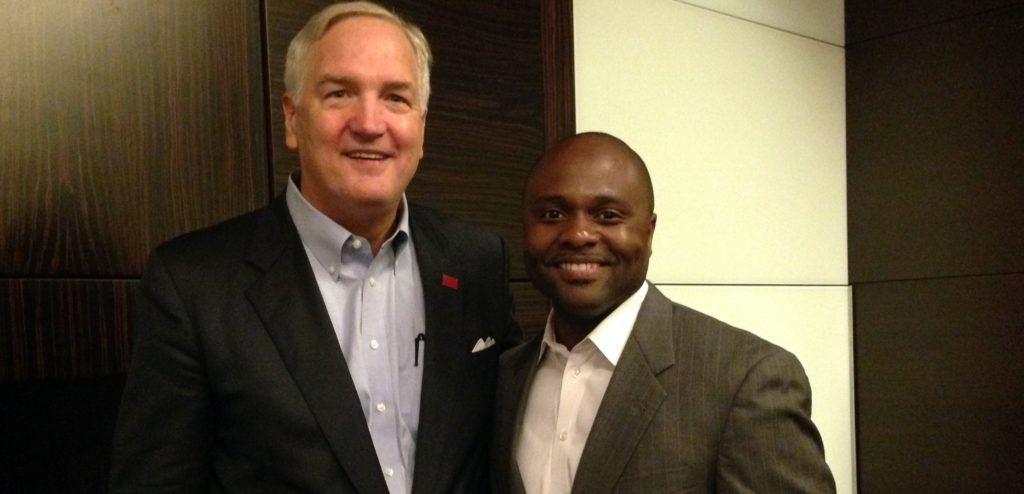
A city councilman from Mobile, Alabama, is in stable condition after he was shot in the face in Johannesburg, South Africa. The city released a statement Monday from relatives of councilman C.J. Small Jr. saying he was shot Saturday when someone ambushed a tour bus on which he was riding. The statement says Small and others were robbed of cellphones and other belongings. City Council spokeswoman Marion Steinfels says Small is expected to recover. Small owns a mortuary and traveled to South Africa for a mortician’s convention. The family says it’s working with the U.S. Consulate in Johannesburg and the secretary of state in Washington. The statement says a relative is with Small at a South African hospital, but it’s unclear when he will be able to return home. Republished with permission of The Associated Press.
Ahead of Tuesday court date, a summary of charges against Speaker Mike Hubbard
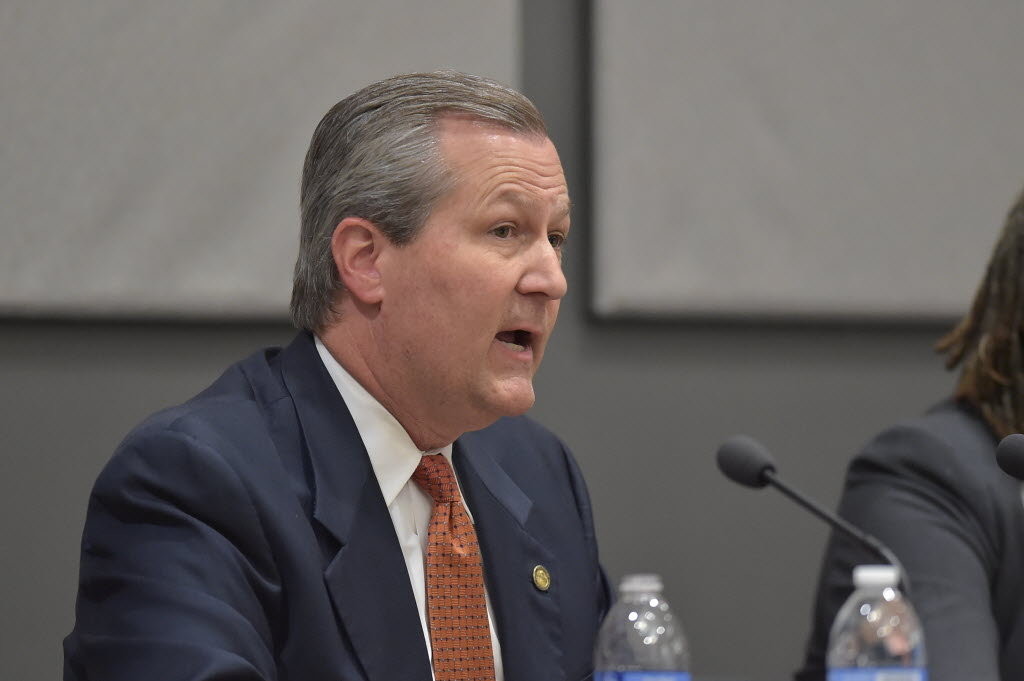
Alabama House Speaker Mike Hubbard goes on trial Tuesday. He is accused of using his political positions to make money and obtain financial favors from lobbyists and companies with business before the Alabama Legislature. Hubbard says he is innocent. Among the charges: — Hubbard is accused of using his past position as chairman of the Alabama Republican Party to steer $1 million in party funds to his media companies, Craftmaster printing company and the Auburn Network. The largest sum, according to prosecutors, was $697,479 in printing work that a Florida company subcontracted back to Craftmaster during the 2010 campaign. — The American Pharmacy Cooperative Inc. hired Hubbard in a $5,000-a-month consulting contract. He is accused of voting for legislation that could have benefited the company even though he had a conflict of interest. Budget language that prosecutors said Hubbard endorsed set requirements for any pharmacy benefit manager that Medicaid might hire. The only company that met the requirements was the Cooperative, Medicaid officials have said. — Hubbard is accused of improperly soliciting or receiving a thing of value from Southeast Alabama Gas. The company hired Hubbard in a $12,000-a-month consulting contract. Hubbard is also accused of being improperly paid to represent Southeast Alabama Gas before the Alabama Department of Commerce and Gov. Robert Bentley. — Hubbard is accused of soliciting political consultant Dax Swatek, Business Council of Alabama board member Will Brooke, a Sterne Agee investment company lobbyist, Great Southern Wood President Jimmy Rane and Hoar Construction company for an investment in his business, Craftmaster Printers. Republished with permission of The Associated Press.
Bradley Byrne: Opioid crisis requires a serious response

I recently saw a local news story about a young 18-year-old boy from Southwest Alabama who struggled with prescription drug abuse. He talked about how it started out small with just a few pain pills but his addiction spiraled out of control until he was seriously ill. Thankfully this young man was able to seek treatment from a local drug abuse program, and now he is preparing to apply to college. Sadly, not every person who struggles with prescription drug abuse is so fortunate. Studies show that approximately 46,000 Americans die because of a drug overdose each year, and young Americans are disproportionately impacted. That adds up to over 130 deaths a day. It is safe to say our nation is facing a serious epidemic when it comes to prescription drug abuse, and the real issue is with opioids. An opioid is a type of narcotic derived from the opium poppy, which includes drugs such as morphine, codeine, hydrocodone, and oxycodone. Opioids are also found in heroin, and many people who struggle with prescription drug abuse ultimately find themselves using heroin. This makes the epidemic even worse. Overwhelmingly, the people who struggle with opioid addiction are not bad people or looking to break the law. The addiction often develops after someone is correctly prescribed pain medicine in response to an injury. In many of the stories I have heard, the addiction develops after a young athlete gets injured playing sports. The opioid epidemic is real, and it is serious. The epidemic doesn’t discriminate about who it affects. It has hit rural areas and urban cities. It impacts the young and the old. It doesn’t care about skin color. Americans from every walk of life have experienced this heartbreaking epidemic one way or another. In the House of Representatives, we have made it a top priority to address the opioid epidemic, and we are committed to doing so in a bipartisan fashion. Just a few weeks ago, the House passed a package of 18 bills designed to address different aspects of the opioid epidemic with large bipartisan votes. A few of the bills would help veterans who are struggling with opioid abuse. It isn’t uncommon for a veteran to come back from combat with serious injuries that require pain medicine. These bills require the Department of Veterans Affairs to bring their pain management guidelines up-to-date while also strengthening education and training for medical professionals. Another bill would create an interagency task force to update medical standards for doctors and create a path forward for pain management. The key is to find ways to treat those with chronic pain while reducing the likelihood of addiction to develop. The Good Samaritan Assessment Act would reform our “good Samaritan” laws to make sure people are protected if they seek medical care for someone who has overdosed on illegal drugs. Yet another bill is designed to study and improve treatment options for babies impacted by prescription drug abuse while they are still in the womb. This is a serious issue that hits our nation’s most vulnerable. The Senate has passed their own opioid legislation, and a Conference Committee will work out the differences between the House and the Senate proposals and get a bipartisan bill to the President’s desk. At the end of the day, the epidemic is too serious for us to just sit back and hope things get better. We must act to stop opioid abuse and ensure that people get the treatment they need. This is an issue where we can come together — as Republicans and Democrats — to address an issue that impacts every single community in the United States, and that is exactly what we are doing. • • • Bradley Byrne is a member of U.S. Congress representing Alabama’s 1st Congressional District.
Presidential Primary Brief: 168 days until Election Day

168 days until Election Day Convention Dates: Republican July 18-21 2016, Democratic July 25-28 2016 Weekly Headlines: Trump slips by Clinton in a virtual dead heat in new poll Mark Cuban: I’d consider a future White House bid Sanders backs DNC chair’s primary opponent NRA facing member backlash over Trump endorsement Press Clips: Model That Correctly Predicted Every Election Since 1980 Gives 2016 Verdict (Daily Caller 5/22/16) One of the world’s most well-known financial institutions which correctly predicted every presidential election since 1980 is predicting a win for Hillary Clinton. Moody’s Analytics, a subsidiary of credit ratings agency Moody’s, believes President Obama’s strong approval ratings will give the Democratic nominee a significant advantage come November. Aviation security, presidential election featured on Sunday talk shows (USA Today 5/21/16) Aviation safety and terrorism will share the spotlight with the 2016 presidential election on the five major Sunday talk shows this week. The cause of the crash of an EgyptAir plane into the Mediterranean Sea remains unknown, but it has renewed questions about how to protect airline passengers from tragic accidents and intentional acts of terror. Members of Congress with responsibility for homeland security, foreign affairs and intelligence appear on four shows, as well as Secretary of Homeland Security Jeh Johnson, who will be on Fox News Sunday. Polls Predict a Tightening Presidential Race (National Review 5/17/16) The results from our latest national survey completed on May 16 shows that the de facto end of the Republican presidential nomination and the continuation of Hillary Clinton’s pyrrhic victory over Bernie Sanders are signaling some important cross currents within national voter opinion. Supreme Court Punts on Little Sisters’ Obamacare Case Until After 2016 Election (Breitbart 5/16/16) The Court expresses no view on the merits of the cases.” With that, the Supreme Court in Zubik v. Burwell (the official name for the various “Little Sisters of the Poor” cases) punted the latest Supreme Court fight over Obamacare to 2017 or beyond — but did so in a fashion that conservatives can be happy about for now, teeing up yet another issue that will be decided one way or the other by 2016’s presidential election. Presidential Elections And The Trump Effect On The U.S. Dollar (Forbes 5/18/16) Politics and economics make for intimate bedfellows. The effects of the former on the latter are significant, particularly when the prize is the Oval Office, as in the case of the U.S. Presidential Elections in November this year. While Hillary Clinton and Bernie Sanders are competing for the Democratic Party leadership nomination, Donald Trump is the Republican Party’s presumptive presidential nominee. The Democratic primary race and the Presidential Elections will have an impact on currency market sentiment, as will the result of the election. Here’s How Many Primaries Are Left (Fortune 5/18/16) Admit it — even the most hardcore political junkies, the ones who have watched every debate and stayed up late on every primary night, are ready for primary season to be over. Soon, it will be. For Democrats, the following states still have to vote: Washington (non-binding primary) on May 24. Virgin Islands (12 delegates) on June 4. Puerto Rico (67 delegates) on June 5. California (548 delegates), Montana (27 delegates), New Jersey (142 delegates), New Mexico (43 delegates), North Dakota (23 delegates), and South Dakota (25 delegates) on June 7. And, finally, Washington, DC (46 delegates) on June 14. On the GOP side, here’s what is left: Washington (44 delegates) on May 24. California (172 delegates), Montana (27 delegates), New Jersey (51 delegates), New Mexico (24 delegates), and South Dakota (29 delegates) on June 7. That’s it. When It Comes To Economic Election Prediction Models, It’s A Mixed Bag (NPR 5/17/16) Most election prediction models that try to forecast who’s going to win the presidency take into account some measure of how the economy is doing. That’s because generally if it’s going strong in the six months or so before the election, history suggests the party currently in the White House will win. If the economy stinks, the party not in the White House takes over. But, what if the economy is just so-so like it is now? 538 founder Nate Silver gives Donald Trump 25 percent chance of beating Hillary Clinton (Washington Times 5/15/16) Political prognosticator Nate Silver said Sunday that he gives Republican Donald Trump a 25 percent chance of winning the 2016 presidential election, while noting that he has been wrong before. Mr. Silver admitted that he initially gave Mr. Trump only a 5 percent chance of capturing the Republican nomination, saying he would peak early and “flame out” like 2012 presidential contender Herman Cain. “This is one of the crazier things we’ve seen in politics for a long time. I think it was fair for us to be skeptical early on about the odds this could occur,” Mr. Silver told CNN’s “Reliable Sources.” Stocks, not polls, could predict election winner (USA Today 5/22/16) Ignore the pundits and polls. If you want to know which candidate will win the presidential election, the stock market will let you know. That’s right, it turns out that the Standard & Poor’s 500 index has “correctly predicted” 19 of the past 22 elections, according to data compiled by Daniel Clifton, an analyst at Strategas Research Partners who specializes in how politics impacts financial markets. So who’s got a better shot at the White House in November? Billionaire Donald Trump? Or former first lady and secretary of State Hillary Clinton? US election: Donald Trump open to talks with North Korea (BBC News 5/18/16) Presumptive US Republican presidential candidate Donald Trump says he is willing to meet North Korea’s leader to discuss its nuclear programme. “I would speak to him, I would have no problem speaking to him,” the businessman said of Kim Jong-un. Such a meeting would mark a significant change of US policy towards the politically isolated regime. Conservatives in secretive group ‘slow walk’ Trump support (CNN Politics 5/17/16) Donald Trump has inflicted a dark night of the


